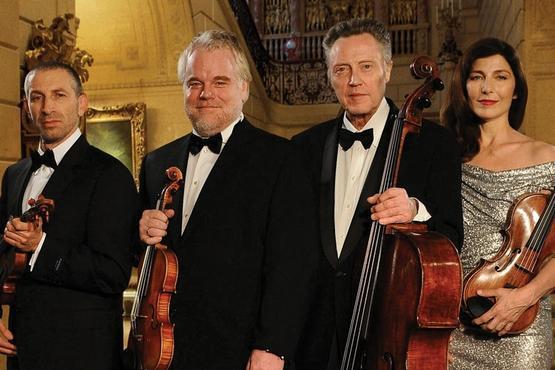A Late Quartet, written and directed by the American documentarian Yaron Silberman, is a subtle, intelligent picture that quietly observes the internal dynamics of the Fugue String Quartet, an internationally acclaimed musical group founded and based in New York that has been playing around the world for 25 years. A Late Quartet begins with bad news. Peter Mitchell (played by Christopher Walken), leader of a world-famous string quartet, is diagnosed with Parkinson’s disease and announces his decision to retire after the first concert of their next season.

They have found satisfaction not in discarding their individuality but in unselfishly contributing to a collaborative endeavour. Their unity is expressed in the music. But all this is to be disrupted, the quartet challenged both singly and as a group. Peter has been having trouble fingering the strings of his cello, and a sympathetic doctor (a gentle performance by Madhur Jaffrey) diagnoses early signs of Parkinson’s disease, and while he accepts this with resigned equanimity the quartet is thrown into confusion. Only on hearing his news do the other three realize that they are not individual free agents; the remarkable success of the quartet means they have grown together as an organic entity, more like a four-way marriage than a family, and perhaps more intimate and mysterious than even that implies. In facing an uncertain future, they begin to consider their own careers as musicians and individuals, and Peter himself is involved in seeking to find a cellist who’ll replace him and assure continuity.
Fissures occur, fears are released. The first violin seeks equality. Robert and Juliette’s marriage is threatened. Their daughter turns against them and embarks on an affair with Daniel, the first violinist.
It is a fascinating role that emphasises the film’s concern with the link between scholarship and the body – or, to put it another way, the relationship between art and life. Life is the thing from which art comes: bloody, incoherent, embarrassing, arbitrary and cruel. Art is an idealised vision of life, with the power to bestow order on chaos.
Fine performances enliven this moving drama about a group of classical musicians whose uneasy harmony is put at risk by illness. One of Christopher Walken’s strengths is to combine subtlety of technique with unpredictability. “Wow!” he responds, when his doctor (played by Madhur Jaffrey) tells him he has Parkinson’s. Like the music with which it is filled, this film is an ensemble piece, and
Walken is not the sole cast member to realize his character so persuasively.
Juliette could have been a thankless role to play, but Keener makes something special of the character, shocked as she is by the scale of her husband’s crisis. One of the film’s most impressive scenes is that in which she confronts Robert and Pilar at a coffee shop in Columbus Circle – a tooth -grindingly contained scene, and all the better for it.
The challenge for Ivanir as Daniel is to play such an unappealing character. He begins as a hermit obsessed to the point of making his own violin bows from horsehair he sources from ranches in upstate New York. As a violinist he is technically expert, if dry and cerebral. “What are you afraid of?” Robert says to him, “Unleash your passion!” Daniel does so by having an affair with Robert’s daughter, whom he has known since she was a young girl.
The film is set during a bitter but deeply romantic New York winter. Central Park is covered in snow. The warm, welcoming interiors contrast with the outside world, reflecting the feelings of the leading figures and the futures they face. The central relationships, spanning decades, have been at the service of music, and are played out in the snowbound pantheons of New York City: the Frick, the Metropolitan Museum, Central Park. And then there is Beethoven’s String Quartet No. 14 in C sharp minor, opus 131, which provides a metaphor for a reading of the film, and is what the quartet will play at Peter’s final appearance with them.
The cinematographer Frederick Elmes, a frequent collaborator of both David Lynch and Ang Lee, has made a wonderful job of locating the characters in their domestic environments – the plain wood of Peter’s spacious brownstone apartment, the seedy hotel where Robert finds temporary refuge when his marriage is threatened, the messy student bedsitter where the rebellious young Alex has a confrontation with her judgmental mother. There are also lovingly staged scenes in the concert hall at the Metropolitan Museum, at a Sotheby’s musical instrument auction, a visit to the Frick Collection, where Peter communes with a late Rembrandt self-portrait, and a drive into the countryside for Daniel to buy horse hair for the bows he crafts.
A Late Quartet is visually and musically rich. But above all there are the performances, individually and as an ensemble, and they’re pitch perfect.
Christopher Walken gives a gentle and atypical performance as Peter, a much-loved and admired cellist, the emotional linchpin of the Fugue Quartet, which has been together for 25 years. He is older and wiser than the others: first violinist Daniel (Mark Ivanir), and the second violinist Robert (Philip Seymour Hoffman) and Juliette (Catherine Keener), who are a married couple.
A Late Quartet
Directed by Yaron Zilberman
Starring Christopher Walken, Philip Seymour Hoffman, Mark Ivanir and Catherine Keener
